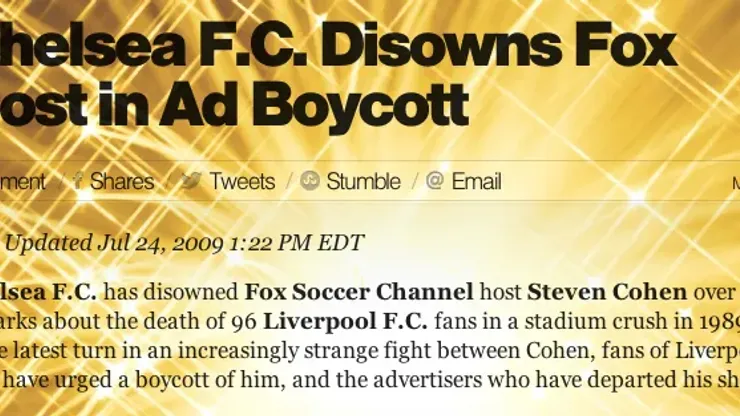On April 13, 2009, two days before the 20th anniversary of the Hillsborough stadium disaster, Steven Cohen said something stupid. “In this weekend’s Sunday papers in England, where they’re all doing big commemorations about the 96, and why we should never forget, nobody discusses the six to eight thousand who showed up without tickets,” Cohen said on the radio show World Soccer Daily. “I’ll leave it at this: if those people don’t show up, this never happens.”
To the uninitiated, Cohen’s claim might seem plausible: ticketless fans force themselves into a crowded stadium and create a fatal crush. But according to Lord Justice Taylor’s report on the incident, although “small groups of fans without tickets were willing to exploit any adventitious chance of getting into the ground,” the primary cause of the disaster was the incompetence of the police officers patrolling Hillsborough. Moreover, Liverpool fans have spent decades making that very point.
By 2009, Cohen, a British expat who served in the American military in the mid-‘80s, had become an influential voice in a nationwide effort to introduce Americans to professional soccer. He co-hosted World Soccer Daily, which aired on Sirius XM five days a week, and appeared on Fox Soccer Channel’s weekly talk show, Fox Football Fone-In.
World Soccer Daily attracted a mixed audience: Ex-pats who had grown up watching soccer, and young, impressionable newbies who hung on Cohen’s every word. Many Liverpool fans feared that Cohen, employing a toxic blend of unsubstantiated assertions and self-righteous bluster, would brainwash the latter group into thinking that drunken, irresponsible Scousers brought the Hillsborough tragedy upon themselves.
After World Soccer Talk exposed Steven Cohen’s lies to the general public, the Liverpudlians quickly mobilized against him. Within weeks of the April 13 show, the Boycott Steven Cohen campaign convinced several World Soccer Daily’s sponsors to abandon the show, and in May Liverpool FC denounced Cohen in a statement on its official website. The protest also took uglier forms: Cohen, who defended his comments despite the mounting criticism, claimed he and his family had received death threats from Liverpool fans. “If these people, using these tactics, came from Afghanistan, or Pakistan, we’d call them terrorists,” he said in the May 21 episode of World Soccer Daily. “They are behaving and acting like terrorists.” In July, Cohen lost his television gig. His empire crumbled.
On the Internet, the reaction to Cohen’s comments continued with a vicious intensity. Conor Brennan, the vice president of Liverpool’s New York supporters club and one of the leaders of the boycott movement, published regular press releases in which he called Cohen a “merchant of hate” and demanded that World Soccer Daily be removed from the airwaves. Football blogs like Big Soccer and Ginge Talks The Footy followed the scandal obsessively, reporting every development in minute detail: the story of the professional mediator who promised to resolve the dispute, then disappeared amid a whirl of recriminations; the claims of the Liverpool fan who reported Cohen to the FBI for sending a vaguely threatening email; the controversy surrounding an offensive pro-Cohen petition.
And then, four months after his initial comments, Cohen abruptly cancelled World Soccer Daily. “This is a country based on freedom of speech, freedom of ideas, freedom of business, freedom of a lot of things,” he said in the show’s final episode. “For me it’s over.” (Cohen went on to start an online show, World Football Daily, which he left in 2011; that show still exists, but with new hosts, it’s virtually unrecognizable.)
Five years later, as we approach the 25th anniversary of Hillsborough, the legacy of the Boycott Steven Cohen movement remains problematic. Cohen expressed an unpopular opinion in an insensitive way – and kept expressing it, even when it became clear he was wrong. Angry fans debunked his theory, scared away his sponsors, and then proclaimed a victory for democracy. Channeling the power of social media, they stuck a blow against misinformed punditry.
But, in the process, the fans silenced a genuinely interesting broadcaster. Cohen was wrong about a lot of things, but his show – always entertaining, occasionally intelligent – was essential to the development of soccer’s American fan base. I miss listening to it. I understand the anger of the supporters who boycotted Cohen to protect the honor of the 96. But I miss listening to World Soccer Daily.
Read more by David Yaffe-Bellany at In For The Hat Trick and follow him on Twitter @INFTH.
200+ Channels With Sports & News
- Starting price: $33/mo. for fubo Latino Package
- Watch Premier League, Women’s World Cup, Euro 2024 & Gold Cup
The New Home of MLS
- Price: $14.99/mo. for MLS Season Pass
- Watch every MLS game including playoffs & Leagues Cup
Many Sports & ESPN Originals
- Price: $10.99/mo. (or get ESPN+, Hulu & Disney+ for $14.99/mo.)
- Features Bundesliga, LaLiga, Championship, & FA Cup
2,000+ soccer games per year
- Price: $5.99/mo
- Features Champions League, Serie A, Europa League & Brasileirāo
175 Premier League Games & PL TV
- Starting price: $5.99/mo. for Peacock Premium
- Watch 175 exclusive EPL games per season






